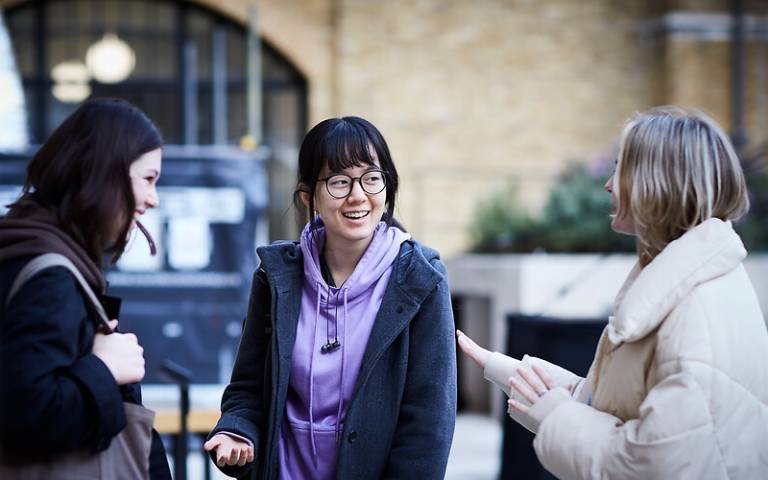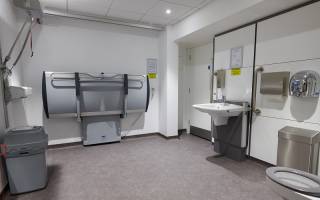Creating an Inclusive Campus for all at UCL, take a five minute questionnaire to have your say
22 February 2023
We are working hard to make our buildings better, to make it easier to get information and to create an inclusive environment where everyone can use the services we offer on campus. Take a short questionnaire to help us prioritise our next steps and enter the £100 voucher draw.

Following a three-year consultation process talking to and listening to your experiences of studying and working on campus, we have developed an action plan to improve the inclusivity of our environment on campus. We want to prioritise fixing the issues that impact you most, and we welcome your input in helping us decide what is most important for you and what should be done first. You can have your say by filling out the five-minute questionnaire below. Alternatively come and visit the team at the Cloisters in the Wilkins Building on 28 February and 8 March between 12pm - 2pm, and Tuesday 7 March 12pm - 2pm at Pool Street West in the reception area.
Complete the questionnaire and have your say
UCL will use the results of this questionnaire to prioritise improvements on the campus. Pip Jackson (Head of Inclusive Environments) has been consulting with students and staff at UCL, and spoke about why an inclusive environment is a strategic priority for UCL “Every individual at UCL should have an equal opportunity to participate and freely contribute to the activities of UCL, and we should be supporting one another to achieve our ambitions. If the environment at UCL is not inclusive of everyone, then we are all impacted either directly or indirectly. That is why creating an inclusive environment is vital. Well-being is a priority for each of us individually, and all of us as a community.”
Whilst improvements have been made, we know that there is much more to be done to improve inclusivity across our campus. Too often there are barriers to access within our buildings, to getting information across our digital estate, and to accessing services on campus. This creates unequal outcomes and experiences for people, and gets in the way of learning, research, and work. Following three years of consultations, Pip shared a summary of what staff and students have said about UCL “The most common themes were about how inaccessible our estate is and how difficult it is to find information about the estate. Our vision is for UCL to be a leader in creating and maintaining inclusive environments that support all our activities.”
Shortcomings are linked to factors including delivering modern research and learning in a large and historic estate, that has buildings from every decade since the 1830s to the present day. Keeping information up to date and accessible for services across over 250 buildings, is not without its challenges.
Have your say
Answering the online questionnaire helps direct the efforts in the next step to improve our buildings and improve access to information and services at UCL. You may have contributed already through the consultations taken out with student and staff groups including our student societies and staff organisations including the Neurodivergent Network. Pip Jackson will be talking to students and staff across campus whilst the questionnaire is open. If you’d like to talk about matters relating to accessibility and inclusion on campus, Pip Jackson and a team of volunteers will be talking to students and staff across campus whilst the questionnaire is open. You can find them during lunchtime (12pm-2pm) in the Wilkins’ Building Cloisters on Monday 27 February and Wednesday 8 March, and in the One Pool Street Reception on Tuesday 7 March.
Ian Dancy, Executive Director of Operations: “This consultation is an opportunity for everyone who is passionate about making UCL as good as it can be, to contribute at the design stage of this project. We’re serious about making the quality and experience of our buildings better. We’ve felt the benefit from the improvements to accessibility in new buildings like PEARL and the Student Centre, which comes from putting inclusion in at the earliest steps of a new design. I’m excited about what we’ll do next.”
Progress we’ve made so far, using your feedback
Where we have been able, we have already started to implement changes across the university based on the feedback we’ve been hearing from you during the consultation process. We introduced our first ‘Changing Places’ sites in the IOE and DMS Watson in 2020 and upgraded dozens of toilets and washrooms across UCL. ‘Changing Places’ is a nationally recognised quality mark for larger accessible toilets for disabled people with complex needs, they include equipment such as hoists, curtains, adult-sized changing benches and space for carers. In 2022, we published an improved policy on washrooms with input from diverse groups of staff and students. The outcome of this policy has been an emphasis on more, higher quality washrooms which create options for a range of personal and spiritual requirements.
From consulting on digital inclusion, we have drafted a new Digital Accessibility Policy which makes accessibility the start point of evaluating any new software either designed in-house or purchased from a third-party provider. This policy outlines best practice and provides real-life examples and use cases for situations that staff are likely to encounter. You can read more about these case studies below.
 Close
Close



